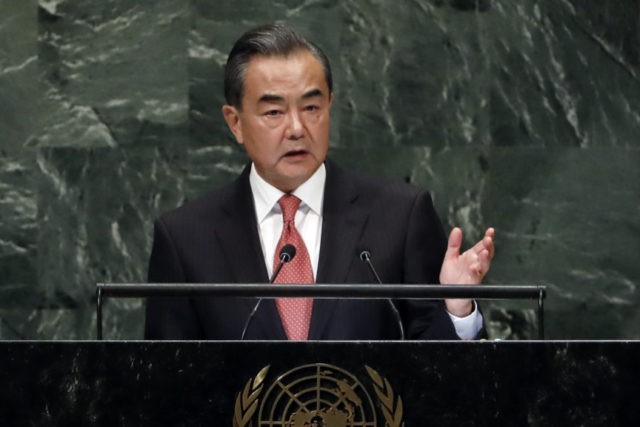Chinese Foreign Minister Wang Yi, representing Communist Party leader Xi Jinping at the United Nations General Assembly on Friday, used his time to urge “win-win cooperation,” promote the sprawling One Belt, One Road (OBOR) debt trap project, and generally avoid confrontation with the United States.
While hinting at dissatisfaction with American tariffs on China by vowing that China would remain “open” to trade and repeatedly urging the promotion of “multilateralism,” Wang did not name the United States specifically in his remarks, even when directly challenging Trump administration policies. The closest Wang’s remarks got to such a challenge was when he urged the world to continue to uphold the Joint Comprehensive Plan of Action (JCPoA), or Iran nuclear deal, but even then did not mention the United States. Instead, in another part of his speech, Wang suggested, “state-to-state relations should be based on credibility, not willful revocation of commitments.” Chinese state propaganda often depicts Trump as an impulsive and unpredictable thinker.
Instead, the challenge for those who support global government, according to Wang, is “that international rules and multilateral mechanisms are under attack, and the international landscape is filled with uncertainties and destabilizing factors.”
The audience for the speech appeared to be developing nations that may find the OBOR program attractive to invest in, not the United States or the greater West, which has increasingly challenged China on everything from its growing influence in Africa to its illegal territorial claims in the South China Sea.
The One Belt, One Road program, or the Belt and Road Initiative, is a series of deals with developing countries in which China promises to build roads, ports, and other major travel infrastructure in exchange for predatory loans with countries that cannot afford them. The nominal goal of the project is to reconstruct the ancient Silk Road, connecting Beijing to western Europe. Yet China has indebted nations as far from the original Silk Road as Kenya, Sri Lanka, and Venezuela as part of the program. Critics argue that the program resembles the tactics European nations used to colonize Africa, India, and other parts of the globe in past centuries.
With this clearing in mind, Wang claimed that China has been, “of all the developing countries … the fastest in opening up on a level unparalleled by others.” He praised Xi Jinping’s “socialism with Chinese characteristics” as bringing “profound changes to China” and asserted that “every country has the right to pursue development.”
“There is no one-size-fits-all model,” Wang asserted. “Every country is entitled to explore a development path that suits itself to deliver happiness and security to its people, and bring a future of confidence and hope to its children.”
“The Belt and Road Initiative proposed by President Xi Jinping is a public good China offers the world. Indeed, it has grown into the largest platform for international cooperation,” Wang continued. “The Initiative is open, transparent and inclusive; it is based on international rules and laws, and it aims to achieve green, environment-friendly and sustainable development.”
He went on to welcome all countries of the world to enter a pact with China on OBOR.
“All along, China has upheld the international order and upheld multilateralism … the international order should be guided by rules, not impulse,” he continued.
While not mentioning President Donald Trump, Wang stated that China hoped to see the United States make concessions to North Korea in its dialogue, and supports the United States opening up to the rogue communist regime in Pyongyang. He added that “China encourages the DPRK [Democratic People’s Republic of Korea] to continue on the right path of denuclearization.”
On Iran, Wang said, “now is a crucial time for the continued implementation of the JCPoA … it serves the common interests of all parties concerned and the international community at large.”
“If the agreement fails to be implemented, the international nuclear non-proliferation regime will be undermined, the authority and role of the Security Council challenged, and peace and stability in both this region and the wider world jeopardized,” Wang said.
China is a signatory to the JCPoA. With the United States out of the deal, the other members of the JCPoA are Iran, Russia, France, Germany, the European Union, and the United Kingdom.
President Trump withdrew from the pact in May, calling it “defective at its core” for the billions in funds that it released to the Islamic regime, which Tehran invested in destabilizing neighbors like Syria, Iraq, Lebanon, and Yemen.

COMMENTS
Please let us know if you're having issues with commenting.